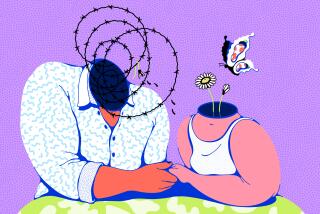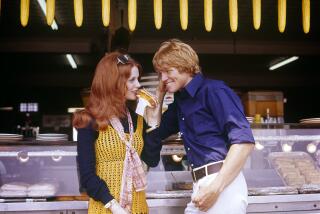Who’s Looking at You, Fella? Could Be She Is
- Share via
NEW YORK — Why can’t a woman be more like a man? Henry Higgins famously posed that question 50 years ago in the Broadway debut of Lerner and Loewe’s smash musical “My Fair Lady.”
The words were hardly out of his mouth before women barged into bastions traditionally reserved for men, from the firehouse to the International Space Station. Even Barbie became an astronaut.
Scottish researchers believe they have discovered a new area where women, particularly those who are financially independent, are just beginning to mimic men: choosing looks over lucre when shopping for a mate.
“We know that we are becoming more equal in the workplace and the economy. We now know that this ability of women to provide for themselves is causing them to change their mate preferences. Our preferences are becoming more like male preferences,” said Fhionna Moore, who led the study at the School of Psychology at the University of St. Andrews in Scotland.
Conducted online, the study examined the responses of 1,851 heterosexual women, ages 18 to 35, who were single, in relationships or married. Most of the participants were from the United Kingdom, elsewhere in Europe and the United States.
The study appears in the May issue of Evolution and Human Behavior. The findings and their implications are intriguing. Essentially, the results turn the historical rules of sexual pursuit upside-down.
“Historically, if you go all the way back to the cavemen, just like the comedy routine, the man went out and got the meat and brought it back to the woman and the woman prepared it. So, historically, women looked to men to be providers and men, historically, have been criticized as being immediately more struck by the physical appearance of a woman,” said Daniel J. Howard, a consumer psychologist, professor and chairman of the marketing department at Southern Methodist University’s Cox School of Business in Dallas.
Although men chose women whose youth and beauty signaled health and fertility, women had to choose partners who would sustain them during child-rearing, when women could not provide for themselves and their offspring, Moore said.
The nature of child-rearing hasn’t changed, but the financial ability of many women to care for themselves and their families has -- which alters the whole equation. “It’s almost as if it were the beginning of a complete role reversal,” she said.
For Allison Agliardo, it’s less about role reversal and more about confidence. “I’ve just gotten more mature and confident in myself. Instead of asking what can I give someone else, it’s saying, ‘Hey, what can he give me?’ ” said Agliardo, 37, a civil engineer in New York.
She and many of her friends earn good salaries; they aren’t looking for men to support them.
The study’s other major finding is that the more ambitious a woman is about career, financial independence and decision-making at home and at work, the more likely she will seek a younger mate.
“I think it’s probably because if you’re very ambitious, you’re expecting to have a career and resource control, so you’re not expecting to be dependent on an older, wealthier partner,” Moore said.
Moore was surprised that the study found no correlation between a woman’s financial independence and her age preference in a mate, although wealthier women did tend toward older men.
But some older, well-heeled women are taking a page from the masculine dating manual: scouting for attractive younger prospects.
Ivana Trump, businesswoman and famous ex-wife of The Donald, is one of them. Asked her reaction to the study’s findings, Trump said in an e-mail, “I love it -- life, love and a woman’s salary are catching up to me!” The 50-something Trump has been dating the 30-something Rossano Rubicondi, an Italian actor and dancer, with whom she recently opened a restaurant on the French Riviera.
“I love having financial independence. I love being paid for what I know, for the ‘brand’ I am. And yes, I can really understand that a woman’s net worth reflects who she chooses to be with,” Trump wrote. “ ... I come to a relationship with a lot of assets -- most importantly, I come with a zest for life. And, for that, you need a young man.”
In fact, finding the right match for a beautiful, wealthy 40-year-old woman from a stable of six, handsome 20-something men formed the premise of “Ivana Young Man,” Trump’s recent two-hour reality TV show on the Oxygen network. Trump’s signature line on the show: “It’s better to be a babysitter than a nurse.”
“The boy-toy thing is really about women who are very powerful and older,” said John Gray, a psychologist and author of several books on relationships, including the 1993 bestseller, “Men Are From Mars, Women Are From Venus.” Although older males tend to resist a woman’s power, “a younger man who has not formed an identity for himself ... is much more willing to yield in her direction,” he said.
Beauty and youth are notoriously poor criteria on which to base a marriage, said SMU’s Howard. “I have a hard time imagining in the long run that this is going to be a significant lifestyle choice for a woman. Why? Because of the experiences of men: It’s mostly pain.
“What you are seeing here, mostly, are some women making the mistakes of men. It doesn’t work,” he said. “Take it from us.”
None of the study’s findings surprised Francesca Mercurio, a New York psychotherapist. “I do see a lot of women who are financially very stable and ambitious and successful and single into their older years. The trend I see is they’re willing to take more risks,” she said. “Whether the risk is going after the younger, hot-looking guy or whether the risk is going after someone even richer, I just think they’re taking more risks across the board ... because their financial safety is already settled.”
Moreover, she said, women’s growing confidence explains their freedom to consider men’s looks more than their financial prospects, “because they can go after the better-looking guy and feel they have something more to offer than just their looks.” In lieu of material support, Mercurio said, “I think some men are a little bit at sea because they haven’t yet found what else they have to offer.”
Moore pointed out that although she was specifically interested in studying the impact of attractiveness and wealth, those hardly were the traits women found most desirable in a mate.
“What always comes out on top with women, and sometimes with men, is kindness and things like dependable character. And that’s been shown over most of the studies that have been done,” she said. “We’re not completely shallow.”






